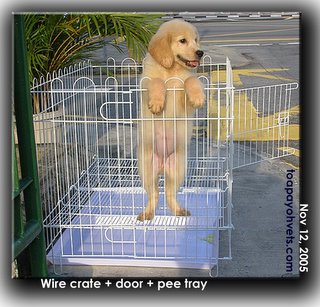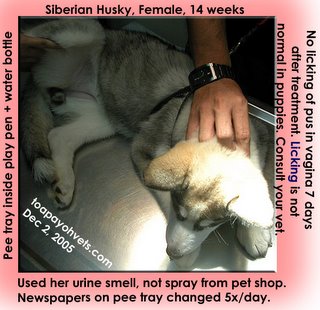Toilet Training Your First Puppy in Singapore
The book is ready for publication in 2006.
ADVERTISERS WANTED:
1. Advertisers who wish to promote a better care and quality of life for dogs are needed to publish this book. Please e-mail to judy@sinpets.com or tel: +65 9668-6568 for more information. Goto: www.sinpets.com.
2. This book will be of great use to Pet Shop Owners
who sell puppies. It is a great gift saving them the time to explain all aspects of toilet training the new puppies and problems likely to be encountered. If they want the front cover on the book to be their own pet shop advertisement,
separate copies can be printed. In this way, they can give/sell a personalised book to their clients when they sell the puppies. The recepients/buyers will find this book a very much appreciated present and
reference for family members.
TOILET-TRAINING YOUR FIRST PUPPY IN SINGAPORE. Dr K Y Sing, BVMS (Glasgow), MRCVS.
A "Be Kind To Pets" community education . Main sponsor is asiahomes.com

Dedicated to: Daniel, Jason and Judy Sing & Mr Huang Wee.
First published in Singapore/China in 2006 by sinpets.com, an associate of Asia USA Realty (Singapore) asiahomes.com Pte Ltd, Blk 1002, Toa Payoh Lor 8, 01-1477, Singapore 319074. judy@asiahomes.com, www.asiahomes.com, +65 9668-6468
Copyright sinpets.com 2006
All rights reserved. No part of this work may be reproduced or utilised in an form or by any means, electronic or mechanical, including photocopying, recording or by any information storage and retrieval system, without the prior written permission of the publisher. Readers are advised to consult their veterinarian as information provided here is for the general knowledge of pet owners and may not be appropriate for their individual pet situation.
ISBN X XXX XXXXX X
Printed and bound in Singapore/China
10 9 8 7 6 5 4 3 2
CONTENTS1.
INTRODUCTION. A toilet-trained puppy lives longer because he is less likely to be given up to the animal shelter. If he needs to be adopted, the new owner will not find him a noise or dirt nuisance. In Singapore, puppies are bought from the home breeder, professional dog breeder and the pet shops usually from 8 weeks old. Toilet training begins on the
first day after purchase.
Should you ignore the whining and barking on the first 3 nights? This book educates the first-time puppy owner on how to toilet-train the puppy in Singapore.
2.
PUPPY DEVELOPMENT Newborn to 12 months old. Temperament. Social, emotional and intellectual development. Lifestyle of owner. Knowledge of owner.
Temperament, energy level and needs to match the home and lifestyle of new owners. Recognising the signs - sniffing, turning, circling, whining, barking, squatting.
Negative reinforcement training. Beat the puppy, force him puppy to smell the stools and urine and show him the appropriate toilet area. This creates fear and distrust. Sometimes eye injuries.
Positive reinforcement training. Praise, food treats and the clicker + treat/praise method.
Residential training. Owner/Trainer training. Puppy kindergarten classes. Obedience training. Careful observation to identify the puppy's behaviour problem.
Qualified animal behaviour specialists/trainer in Singapore?
3.
TOILET TRAINING EQUIPMENT Housebreaking aids from the pet shop.
Newspapers with puppy's urine.
Puppy Training Pads & Pad Holder.
Litter box with wood shavings.
Playpen,
Pee tray (pan).
Platform Tray.
Crate(cage). What is crate training?
Urine neutralisers, carpet neutralisers.
Repellents.
Obstacles.
Household disinfectants mask or enhance odour.
Obsessive
compulsive behaviour needing your attention all the time.Exercises tire out dog. Special chew toys or long-lasting food treat at bedtime.
Calmatives such as D.A.P (dog appeasing pheromone). DAP Diffuser anti-stress to dogs for messing crate overnight, pheromones, drug medication for behaviour modification by the vet. Seeking the assistance of a animal behaviourist. www.apbc.org.uk (The Association of Pet behaviour Counsellors).
Other approaches. Talk to your vet or veterinary behaviourist about other approaches including anti-anxiety medication.
Radio on.
Sudden noise, air gun, water gun.
4.
TOILET TRAINING METHODS Playpen, Crate, Leash, Small room, Pee tray, Pee platform.
Full-time training.
Positive reinforcement training. Clicker + food treats. Praise +/- Food treats.
Positive reinforcement methods. Humane methods.
Negative reinforcement methods. Physical punishments. Head collar, muzzle, electric collar to restrain the puppy from barking.
5.
TOILET LOCATION INDOOR. Balcony, kitchen (see people),living area, common bathroom.
whole apartment.
Playpen - big for dam and pups. Newspaper train pups by 3 weeks old.
Bedroom messed up. Parquet floor scratched by nails.
Playpen with no gates.
Playpen elevated, wire flooring, pee tray below.
Playpen for large breeds.
Ground floor apartment. Big breeds need kennel.
OUTDOOR. Grass. Adult dogs fouling the apartment and bigger breed dogs especially.
INDOOR & OUTDOOR. Exercise. Newspapers to pick up or let dog pass poop onto it (Responsible Pet Ownership).
6.
ACCIDENTS Not paying attention to the signs: Sniffing, circling, turning, squatting.
Too excited, distracted, too young, inconsistency of family members, puppy not so smart. Seek expert help.
Too large an area to roam - Urine odours. Natural instinct to keep clean.
Whining and continuous barking.
New smells, new dogs, stress, baby. New homes.
7.
PROBLEMS Shredding newspapers. Ripping training pads.
Barking on first night. Morning mess makes owner angry.
Chewing basket bed or cloth - intestinal obstruction.
Relapses - boarding, new arrivals, tiled floor, carpet.
Toilet too far away at night. Master bathroom?
Whining to go to the toilet at night and to change soiled papers after midnight.
Tiled area preferred.
Infected bladder or private parts
Kennel cough. Parvovirus. Skin diseases. Consult your vet early.
Vomiting and diarrhoea. Blood in stools.
Blood in stools and vomiting.
Flatulence & diarrhoea.
Submissive/Excitement urinaton.Urine marking. Mounting people or objects.
Eating stools, drinking urine.
Feeding after 8 p.m. Irregular feeding times esp. weekends.
Stomach worms. Ticks, fleas and lice.
Toilet-training problem, anti-social behaviour, stool eating. Noise phobias. Separation anxiety, destructive tendencies, lack of human interaction skills (smells, noises and routines). Regular routine - Dogs to be exercised on and off the lead and socialised with other dogs 4X per day.
No time to train - Take 7 days' leave. Sleep with the puppy.
Behavioural problems. Puppy biting, nipping and chewing. Jumping on people. Barking, Digging. Fear-aggression, dominance, digestive,urinary problems, flatulence.
8.
A SCHEDULE Plan. Consistent commands by all family members. Perseverance.
Restricted zone for new puppy.
Feeding Schedule. 2 times per day. Fixed hours. No supper. Water taken away.
Exercise Schedule. After waking up, eating, playing.
Water bottle or water bowl? Splashing on body. Withhold water after 7 p.m.
Positive reinforcement. Clicker + food treat. Praise +/- food treat.
Smelly area for toilet.
Sick puppies. Hypoglycaemia chihuahuas, mini-Maltese, Yorkshire Terriers & Pomeranians.
Home-alone puppy confined 3 - 8 hours. Bigger space to keep clean.
Takes 7 days'leave. Buy puppy over the week-end. Sleep near the puppy. Wiped his backside.
9.
SINGAPORE'S PUPPY LAWS. Puppies in pet shops. Grooming centres. Anti-littering. Bring newspapers, dog poops on papers, throws in bin. Barking. Biting. Noise nuisances. Yellowing of grass patches - urine.
10.
RESPONSIBLE PET OWNERSHIP AS REGARDS PUPPIES. Projects to benefit the community. AVA's public education and seminars in Singapore. Environment - stools. Low-cost neutering, microchipping, vaccination, roadshows, school talks provide practical help and creating awarewness about responsible pet ownership, community visiting e.g children's wards.
11.
FREQUENTLY ASKED PUPPY QUESTIONS. http://www.toapayohvets.com/sinpets/040809FAQ.htm. Vaccinations.
12.
PICTURES OF PUPPY BEHAVIOUR AND TOILET TRAINING EQUIPMENT IN SINGAPORE. 13.
ABOUT THE AUTHOR. Dr K Y Sing, BVMS (Glasgow), MRCVS (Dr Sing Kong Yuen) is a veterinary surgeon in Toa Payoh Vets, a small animal practice in Singapore. In 1982, he founded Toa Payoh Vets, www.toapayohvets.com.
In 1997, Dr Sing started to educate first-time small animal owners using the internet at www.asiahomes.com's "Be Kind To Pets" community education project. Education continued using vaccination cards. During consultation, many puppy owners (adults and children) have little knowledge on how to use the housing bought from the pet shop. There was a need for an instruction manual. How did Singapore pet owners toilet train their puppies? Over 150 new puppy owners were interviewed during consultation in 2004 and 2005. The reports are at:
http://puppytoilettraining.blogspot.com/. The book condensed the important findings in the research to make it easy for children and time-pressed adults to read.
14.
10 CASE STUDIES FROM INTERVIEWSCases are selected from over 150 new puppy owners interviewed by Dr Sing. Details at: http://puppytoilettraining.blogspot.com/
Stories include: 14.1 The aged stay-at-home mum was stressed by the Schnauzer's mess.
14.2 "How to talk to the puppy not to step on his poop overnight?" the stressed mum asked the vet.
14.3 Would the labrador retriever puppy be able to hold his urine from the 19th floor to the grass every morning?
14.4 Wood shavings injured the eye of the Shih Tzu puppy.
14.5 "Either the puppy goes or I go," the wife gave an ultimatum.
14.6 "The crate is a prison for the puppy," the soldier said to his father.
14.7 No puppy should drink from a water bottle?
14.8 "The cross-bred puppy is not permitted to live in this HDB flat," the canine enforcement officer and the HDB warned.
14.9 The platform tray was best for the townhouse Golden Retriever.
14.10 Two puppies out-peeing and out-pooing each other.
15.
MY PUPPY PICTURES SCRAPBOOK. Health & Microchip records. Tips on puppy digital photography for children.
16.
INDEX17.
ACKNOWLEDGEMENTS18.
REFERENCEShttp://www.urbanhound.com/
20.
FEEDBACK FROM READERS. E-mail your success stories and tips on toilet-training of your dog to judy@toapayohvets.com. Your stories will be published on the website. to help puppies and first-time owners all over the world.







